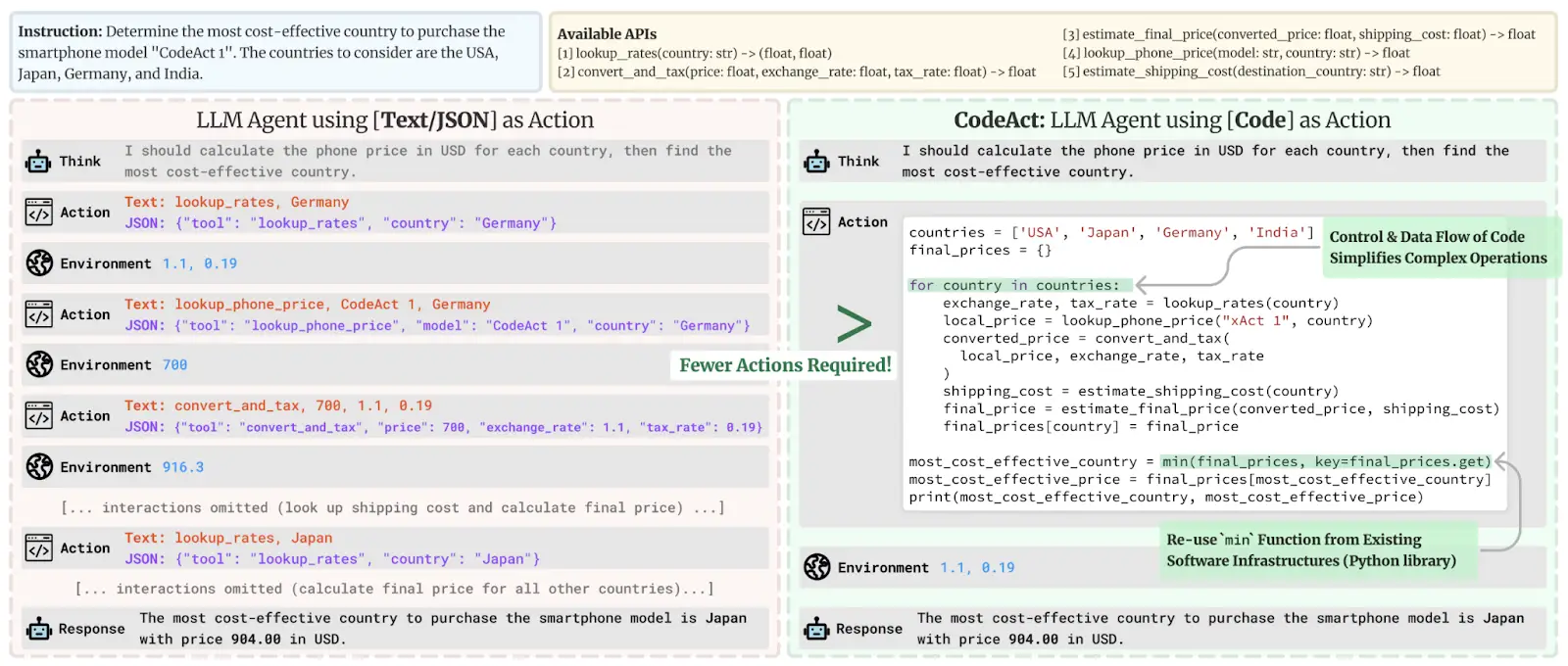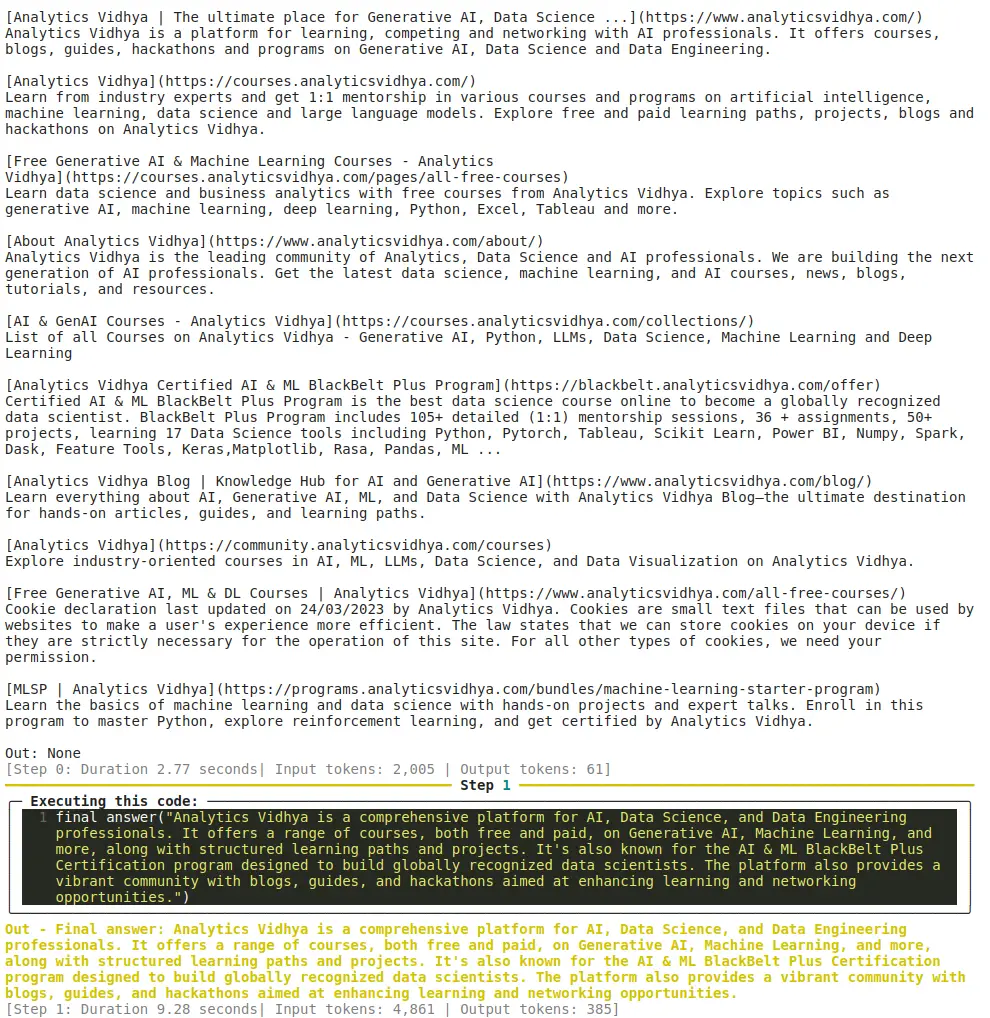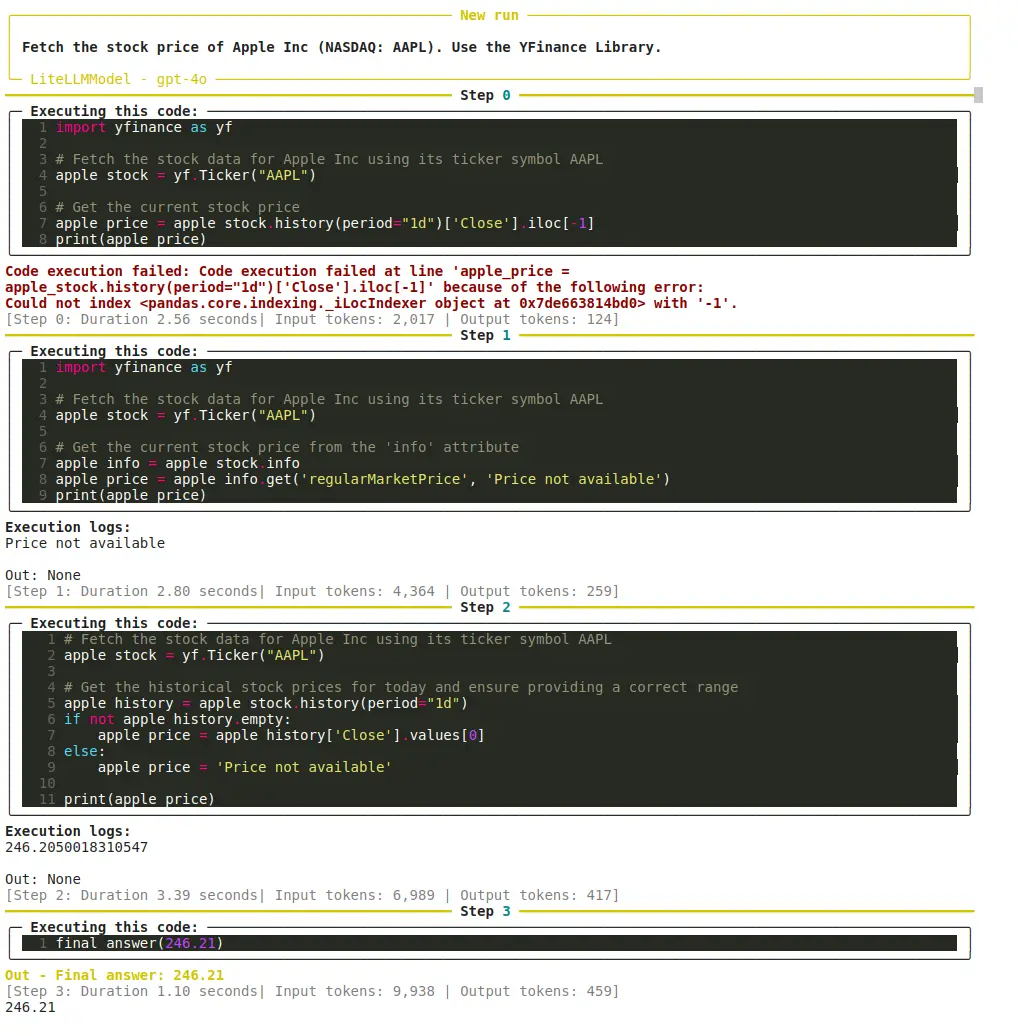SmolAgents by Hugging Face: Build AI Agents in Under 30 Lines
Happy New Year! My exploration of AI Agents in 2025 led me to Hugging Face's SmolAgents framework. Let's dive in!
Hugging Face's SmolAgents library, launched in 2025, simplifies running powerful agents with minimal code. Its ease of use, Hub integrations, and broad LLM compatibility make it ideal for agentic workflows.
Table of Contents
- What is SmolAgents?
- Understanding AI Agents
- Multi-step Agent Example
- SmolAgents Key Features
- SmolAgents Capabilities:
- Code Agents
- Local Python Interpreter
- E2B Code Executor
- SmolAgents in Action:
- Demo 1: Research Agent
- Demo 2: Stock Price Retrieval
- Conclusion
What is SmolAgents?
SmolAgents is a concise, powerful library for building and running agents. Its compact design (around 1,000 lines of code) prioritizes ease of use without sacrificing functionality. It excels at supporting "Code Agents," which generate and execute code, and offers enhanced security via sandboxed environments like E2B. It also supports traditional ToolCallingAgents using JSON or text-based actions. SmolAgents integrates with various LLMs (Hugging Face Inference API, OpenAI, Anthropic, etc. via LiteLLM) and a shared tool repository on the Hugging Face Hub.
Understanding AI Agents
AI Agents are autonomous systems performing tasks on behalf of users or other systems. They achieve this by orchestrating workflows and using external tools (web searches, code execution, etc.). LLMs power these agents, integrating tool usage for real-time information. Essentially, they bridge LLMs and the external world, enabling action and decision-making. Agency exists on a spectrum, with LLMs having varying degrees of control over system actions.
| Agency Level | Description | Name | Example |
|---|---|---|---|
| ☆☆☆ | LLM output has no impact on program flow | Simple Processor | process_llm_output(llm_response) |
| ⭐☆☆ | LLM output determines an if/else switch | Router | if llm_decision(): path_a() else: path_b() |
| ⭐⭐☆ | LLM output determines function execution | Tool Caller | run_function(llm_chosen_tool, llm_chosen_args) |
| ⭐⭐⭐ | LLM output controls iteration and program continuation | Multi-step Agent | while llm_should_continue(): execute_next_step() |
| ⭐⭐⭐ | One agentic workflow starts another | Multi-Agent | if llm_trigger(): execute_agent() |
Multi-step Agent Example

Agents handle complex tasks by using multiple tools and adapting to different situations. Unlike traditional programs with rigid workflows, agents manage complexity and unpredictability more effectively.
SmolAgents Key Features
For simple tasks, custom code suffices. However, for complex behaviors (tool calling, multi-step agents), SmolAgents provides essential structure:
- Tool Calling: Agent output follows a specific format (e.g., "Thought: Use 'get_weather'. Action: get_weather(Paris).") processed by a parser. The system prompt guides the LLM on this format.
- Multi-step Agents: LLM prompts are tailored based on previous iterations, requiring memory for context.
SmolAgents integrates these components seamlessly: LLM, tools, parser, system prompt, memory, and error handling.
SmolAgents Capabilities
Code Agents
Using code (instead of JSON) for tool actions is superior due to its efficiency, composability, object management capabilities, generality, and compatibility with LLM training data.

Local Python Interpreter
The CodeAgent uses a secure LocalPythonInterpreter with controlled imports, operation limits, and predefined actions.
E2B Code Executor
For enhanced security, SmolAgents integrates with E2B for sandboxed code execution.
from smolagents import CodeAgent, VisitWebpageTool, HfApiModel
agent = CodeAgent(tools=[VisitWebpageTool()], model=HfApiModel(), additional_authorized_imports=["requests", "markdownify"], use_e2b_executor=True)
agent.run("What was Abraham Lincoln's preferred pet?")SmolAgents in Action
Demo 1: Research Agent
!pip install smolagents
from smolagents import CodeAgent, DuckDuckGoSearchTool, HfApiModel
model = LiteLLMModel(model_, api_key="YOUR_API_KEY") # Replace YOUR_API_KEY
agent = CodeAgent(tools=[DuckDuckGoSearchTool()], model=model)
agent.run("Tell me about Analytics Vidhya")
Demo 2: Stock Price Retrieval
!pip install smolagents
import yfinance as yf
model = LiteLLMModel(model_, api_key="YOUR_API_KEY") # Replace YOUR_API_KEY
agent = CodeAgent(tools=[DuckDuckGoSearchTool()], additional_authorized_imports=["yfinance"], model=model)
response = agent.run("Fetch the stock price of Apple Inc (NASDAQ: AAPL). Use the YFinance Library.")
print(response)
Conclusion
SmolAgents simplifies AI agent development. Its key strengths are simplicity, versatility, security, the use of code for tool actions, and its integrated ecosystem. It's a valuable tool for building adaptable and scalable agentic systems. Consider exploring the Agentic AI Pioneer Program for deeper insights.
The above is the detailed content of SmolAgents by Hugging Face: Build AI Agents in Under 30 Lines. For more information, please follow other related articles on the PHP Chinese website!

Hot AI Tools

Undresser.AI Undress
AI-powered app for creating realistic nude photos

AI Clothes Remover
Online AI tool for removing clothes from photos.

Undress AI Tool
Undress images for free

Clothoff.io
AI clothes remover

AI Hentai Generator
Generate AI Hentai for free.

Hot Article

Hot Tools

Notepad++7.3.1
Easy-to-use and free code editor

SublimeText3 Chinese version
Chinese version, very easy to use

Zend Studio 13.0.1
Powerful PHP integrated development environment

Dreamweaver CS6
Visual web development tools

SublimeText3 Mac version
God-level code editing software (SublimeText3)

Hot Topics
 1378
1378
 52
52
 I Tried Vibe Coding with Cursor AI and It's Amazing!
Mar 20, 2025 pm 03:34 PM
I Tried Vibe Coding with Cursor AI and It's Amazing!
Mar 20, 2025 pm 03:34 PM
Vibe coding is reshaping the world of software development by letting us create applications using natural language instead of endless lines of code. Inspired by visionaries like Andrej Karpathy, this innovative approach lets dev
 Top 5 GenAI Launches of February 2025: GPT-4.5, Grok-3 & More!
Mar 22, 2025 am 10:58 AM
Top 5 GenAI Launches of February 2025: GPT-4.5, Grok-3 & More!
Mar 22, 2025 am 10:58 AM
February 2025 has been yet another game-changing month for generative AI, bringing us some of the most anticipated model upgrades and groundbreaking new features. From xAI’s Grok 3 and Anthropic’s Claude 3.7 Sonnet, to OpenAI’s G
 How to Use YOLO v12 for Object Detection?
Mar 22, 2025 am 11:07 AM
How to Use YOLO v12 for Object Detection?
Mar 22, 2025 am 11:07 AM
YOLO (You Only Look Once) has been a leading real-time object detection framework, with each iteration improving upon the previous versions. The latest version YOLO v12 introduces advancements that significantly enhance accuracy
 Is ChatGPT 4 O available?
Mar 28, 2025 pm 05:29 PM
Is ChatGPT 4 O available?
Mar 28, 2025 pm 05:29 PM
ChatGPT 4 is currently available and widely used, demonstrating significant improvements in understanding context and generating coherent responses compared to its predecessors like ChatGPT 3.5. Future developments may include more personalized interactions and real-time data processing capabilities, further enhancing its potential for various applications.
 Best AI Art Generators (Free & Paid) for Creative Projects
Apr 02, 2025 pm 06:10 PM
Best AI Art Generators (Free & Paid) for Creative Projects
Apr 02, 2025 pm 06:10 PM
The article reviews top AI art generators, discussing their features, suitability for creative projects, and value. It highlights Midjourney as the best value for professionals and recommends DALL-E 2 for high-quality, customizable art.
 o1 vs GPT-4o: Is OpenAI's New Model Better Than GPT-4o?
Mar 16, 2025 am 11:47 AM
o1 vs GPT-4o: Is OpenAI's New Model Better Than GPT-4o?
Mar 16, 2025 am 11:47 AM
OpenAI's o1: A 12-Day Gift Spree Begins with Their Most Powerful Model Yet December's arrival brings a global slowdown, snowflakes in some parts of the world, but OpenAI is just getting started. Sam Altman and his team are launching a 12-day gift ex
 Google's GenCast: Weather Forecasting With GenCast Mini Demo
Mar 16, 2025 pm 01:46 PM
Google's GenCast: Weather Forecasting With GenCast Mini Demo
Mar 16, 2025 pm 01:46 PM
Google DeepMind's GenCast: A Revolutionary AI for Weather Forecasting Weather forecasting has undergone a dramatic transformation, moving from rudimentary observations to sophisticated AI-powered predictions. Google DeepMind's GenCast, a groundbreak
 Which AI is better than ChatGPT?
Mar 18, 2025 pm 06:05 PM
Which AI is better than ChatGPT?
Mar 18, 2025 pm 06:05 PM
The article discusses AI models surpassing ChatGPT, like LaMDA, LLaMA, and Grok, highlighting their advantages in accuracy, understanding, and industry impact.(159 characters)




